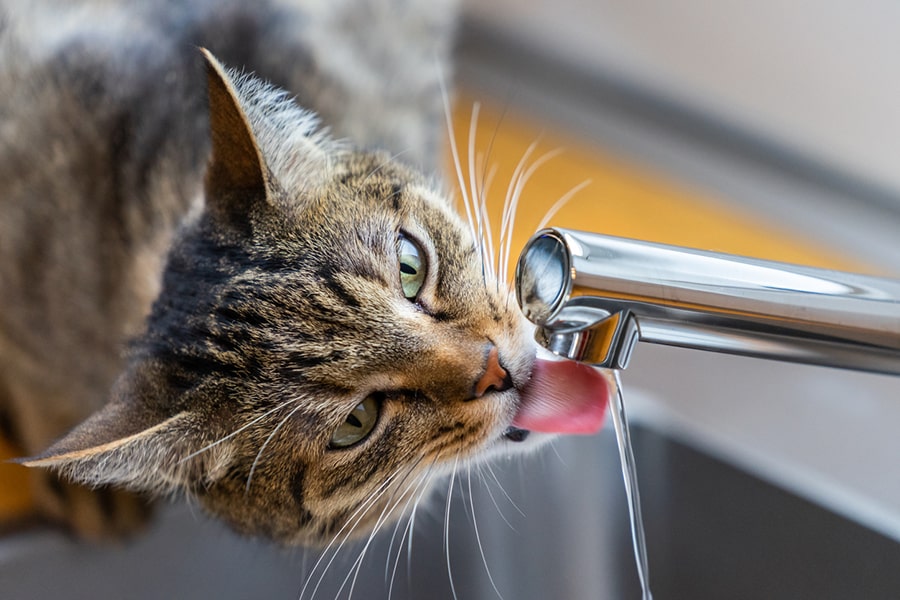Cats are notorious for their grooming habits, spending a significant amount of time licking themselves to keep their coats clean and healthy. However, it’s not uncommon for cats to extend their licking behavior to other objects, including pillows. In this article, we’ll explore the reasons behind this peculiar habit and provide insights into your cat’s behavior.
Licking Themselves Clean
The primary reason cats lick is to groom themselves. Their rough tongue acts like a brush, helping to remove dirt, debris, and loose fur from their coats. Additionally, their teeth come into play when dealing with more stubborn particles. Cats also use their forepaws as washcloths, wetting them with their tongues and using them to clean hard-to-reach areas.
Addressing Itchiness
If your cat is frequently licking your pillow, it could be a sign of itchiness. Cats may lick a specific spot to alleviate itchiness caused by fleas, allergies, or other skin problems. If you notice that your cat is intensely focused on licking a particular area, it’s essential to check it for signs of redness, inflammation, or discoloration. If any abnormalities are present, consult your veterinarian for a proper diagnosis and treatment.
Soothing Discomfort
Sometimes, cats lick themselves to soothe irritated skin or painful spots. For example, they might lick at a cut, abrasion, or joints affected by arthritis. While licking may provide temporary relief, excessive licking can worsen the situation and potentially lead to infection. If you notice your cat repeatedly licking a specific area, it’s important to consult your veterinarian for further examination and guidance.
Finding Comfort
Licking can be a comforting behavior for cats, helping them relax and cope with anxiety or stress. When cats lick, their bodies release endorphins, which create a sense of happiness and contentment. If your cat’s licking becomes excessive and starts to result in skin damage, it’s crucial to identify the underlying cause of their distress. Changes in routine, new additions to the household, or boredom can all contribute to anxiety in cats. Providing environmental enrichment, such as interactive toys, nature shows, or scheduled playtime, can help alleviate their anxiety and reduce excessive licking.
Frequently Asked Questions
Why do my cats lick each other then fight?
If you have multiple cats in your household, you may observe them engaging in grooming behavior followed by play fighting. This is a normal interaction between cats and can occur due to various reasons:
- Transitioning from grooming to play is a natural progression for cats.
- Cats use body language and behaviors to communicate with each other. Pulling back or biting during grooming could indicate that they’ve had enough.
- During mutual grooming, a cat might nip at the other cat’s fur to remove mats or debris, which may be misinterpreted as an invitation to play fight.
There is usually no cause for concern unless the play fighting becomes overly aggressive or distressing for either cat.
Why does my cat lick then bite me?
Similar to cats grooming each other, cats may lick and then bite their human companions as a means of transitioning from grooming to play. Alternatively, they may be indicating that they’ve had enough attention or petting. Some cats even give licks and gentle love bites to express affection towards their owners.
Why do cats lick blankets?
Licking blankets, also known as wool sucking, can be a soothing behavior for cats. It reminds them of nuzzling with their mother and littermates when they were young kittens. While many cats outgrow this behavior as they mature, it’s important to ensure they do not tear off and swallow pieces of the blanket, which can lead to choking or digestive issues.
Why do cats lick plastic?
Some cats find licking plastic objects enjoyable due to the texture or smell. Licking plastic grocery bags, for instance, can be enticing because they retain the scent of food. However, excessive licking of non-food items, including plastic, may indicate a condition called pica. Pica can result from health conditions, dietary deficiencies, compulsive disorders, lack of mental stimulation, or stressful changes in routine. If you suspect your cat has pica, it’s advisable to consult your veterinarian for proper evaluation and guidance.
Why is my cat licking the wall?
Similar to licking plastic objects, licking walls could be a sign of pica or the presence of a pleasant taste on the wall surface. It’s possible that some food or drink was spilled or splashed on the wall, leaving behind an enticing flavor. Ensure that your cats’ environment is free from any substances that may be harmful if ingested.
What can I do about excessive licking?
If your cat’s licking behavior gives you cause for concern or if they are overgrooming, it is recommended to seek veterinary attention. A veterinarian can evaluate your cat’s overall health, identify any underlying issues, and provide appropriate treatment. Additionally, consider pet insurance to help cover the costs of potential treatments. However, it’s important to remember that the information presented in this article is for educational purposes only and should not replace professional veterinary advice.
Conclusion
Understanding why cats lick objects, including pillows, can help pet owners better comprehend their feline companions’ behavior. From grooming and itchiness to comforting and distress, cats have various reasons for engaging in this behavior. By observing their habits and seeking professional guidance when needed, we can ensure the well-being of our beloved pets.
This article is brought to you by Pawsoha, a professional blog in the pet industry, providing informative and reliable content for pet enthusiasts and lovers.
